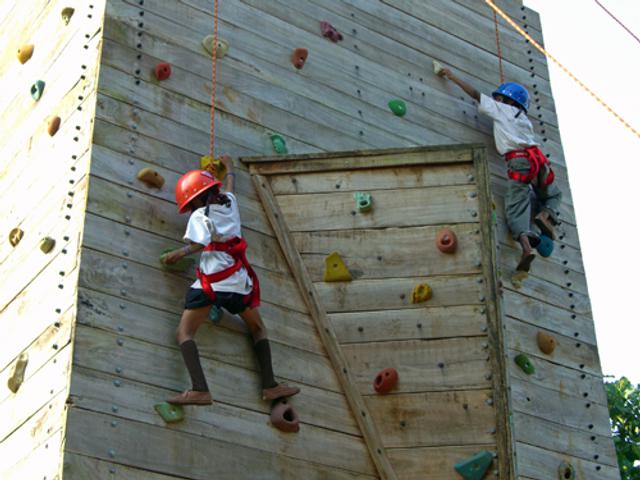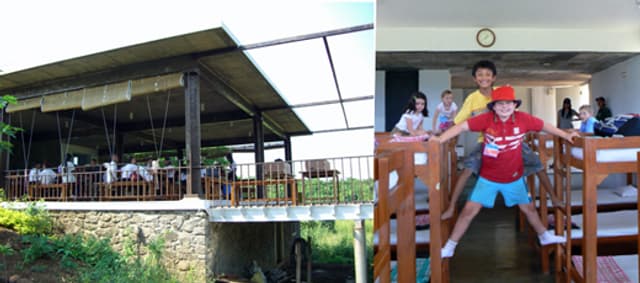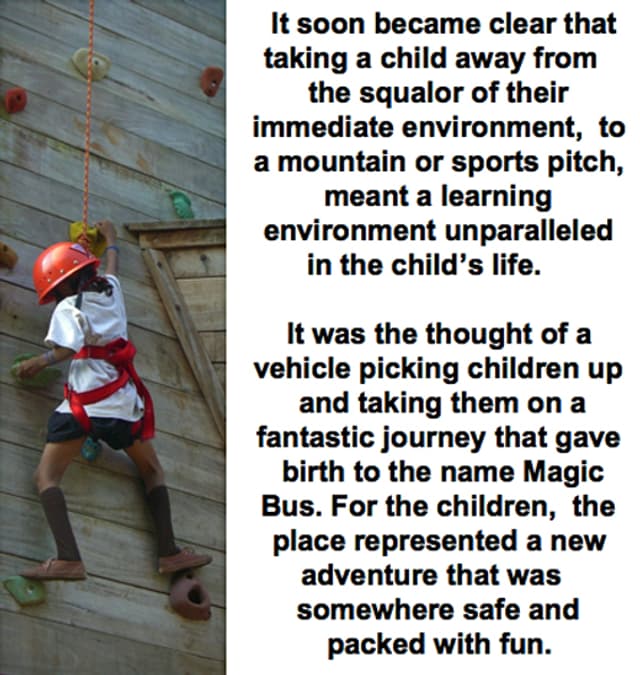The Magic Bus: corporate customers pay for a facility that helps poor kids
- Exhibited by
- Sattva
- Added
- February 26, 2015
- Medium of Communication
- Face to face.
- Target Audience
- Individuals, corporations.
- Type of Charity
- Children, youth and family, education, sports and recreation.
- Country of Origin
- India.
- Date of first appearance
- October, 2006.
SOFII’s view
Magic Bus started from a chance encounter with some children living in the slums of Mumbai and a rugby match. Now the team is using sport and outdoor learning to change the lives of thousands of children each year. The world-class Magic Bus Centre was built through the generosity of many different donors. Now after only three years it has become an excellent example of ‘sustainable’ fundraising. Through its facilities Magic Bus now offers programmes to affluent schools and commercial organisations that fund the organisation’s work with poor children and expects to raise all its funds through its services in the very near future.
Creator / originator
The Magic Bus team
Summary / objectives
Magic Bus is a not-for-profit organisation in India that uses sport to realise the potential of children living in extreme poverty. Magic Bus provides them with positive role models in their lives, self-belief and a sense of purpose. Using outdoor learning, Magic Bus helps children to know that they have the power to change their future. Since it started, over 60,000 children have taken part in the programmes and the organisation is currently expanding its programme across the country.
Magic Bus runs the Magic Bus Centre for Learning and Development in Mumbai to support its child development programmes. The centre spans 22 acres and provides world-class facilities for outdoor experiential learning. It has the capacity to offer programmes to well over 10,000 children every year and has residential capacity for over a hundred children each day. It features India’s first international standard challenge course including a high ropes course, artificial rock climbing tower, which includes a rappelling face and a breathtakingly fast zipline. The low ropes course includes a bouldering wall, and the obstacle course was specifically designed by the Magic Bus team.
Today, the centre is not only used for the Magic Bus programmes, but also to enable Magic Bus to raise funds by providing services to schools and commercial organisations.
Background
Matthew Spacie, former COO of Cox and Kings (then India’s largest travel company), was practising rugby with friends when he met some children from the slums of Mumbai and invited them to join in. Within six months they had formed the Magicians rugby club and a short time after Matthew started seeing dramatic behaviour changes in the children. Together with a local NGO, Akanksha, he then formed a group to take around 50 children living in the slums to the countryside each month for a weekend camping trip, as well as continuing the rugby sessions.
However, intervention through sports was very new in India and the parents were suspicious about letting their child participate. So, Magic Bus had to ensure that there was the right infrastructure and facilities to safeguard the children, while retaining the spirit of adventure. They also realised that to have a sustainable impact on the children it was important to work with them through a structured programme over a few years rather than focusing on sporadic exercises.
Today Magic Bus has structured programmes for children of various age groups, which allow them to interact and work with the children for a prolonged time and thus help them identify their strengths and skills.
The Magic Bus Centre is tailored to the needs of these programmes and to the spirit and methodology of Magic Bus. The Centre’s objectives are to offer the highest quality of outdoor development learning to children and young people, while providing a safe environment for them to learn and play.
It also offers a stimulating environment for capacity building trainers to deliver the Magic Bus programme and sport.
Special characteristics
One of the key tenets of Magic Bus is sustainability and the centre is an excellent example of this. By creating a facility that is relevant to people from all walks of life, the Centre acts as a long-term and sustainable channel for raising funds.
Secondly, the centre is closely interwoven with the methodology and fundamental goals of Magic Bus. So, in addition to running the programmes of Magic Bus, it provides the means to introduce schools and commercial organisations to Magic Bus ideals. By allowing members from these organisations to participate in experiential training, it also provides an excellent way to build strategic relationships with these organisations.
Thirdly, inviting students from all walks of life (from marginalised sections to the affluent schools), gives the Magic Bus Centre the opportunity to show the students each other’s lives and dreams. All the children are treated equally within the centre and provided the same facilities. There are also events planned where students from various walks of life can interact with each other.
Influence / impact
The Magic Bus Centre was built through the generous donations of both organisations and individuals. Now, nearly three years later, it is expecting to cover its operating costs through revenue earned through its programmes to different groups. Their aim is eventually to have all programmes independent of grants so that they fund their work themselves.
They are working with private and international schools in Mumbai to provide their students with activities focused on fun, adventure and learning basic outdoor skills.
Commercial organisations also pay Magic Bus for behavioural skills training. Employees take part in a day or two-day learning programme that combines outdoor activities with experiential learning. Magic Bus also gives them the opportunity to work with children, by training them to lead groups of children when they are on camps at the centre.
Magic Bus has a robust model for growth through ‘training of trainer’ programmes (TOT). Many of these programmes will be held at the centre and will generate revenue for the centre.
Costs
The operating cost of the centre is around 150 million rupees per year. The aim is to be able to cover these costs by the revenue generated from the Magic Bus Centre.
Results
Magic Bus continues to strive to make the optimal use of the centre. The organisation constantly receives requests from film studios and other organisations to use the centre for non-development related activities (e.g. shooting films). However, Magic Bus is clear about using the centre purely for activities that align with the vision of the organisation.
Merits
The Magic Bus Centre is a great example of sustainable fundraising. By creating a facility to realise their core methodology, Magic Bus has been able to put to practice programmes that have substantial impact on the children. They have also been able to extend their methodology to different types of participant – rich and poor, young and old. Organisations can take the Magic Bus example to create sustainable sources of fundraising by extending their programmes to different communities.
Through the centre Magic Bus has been able to build strategic relationships with organisations who can participate in the experiential learning process and recognise the value that Magic Bus brings to the society.
Other relevant information
More information about Magic Bus is available at their site.
 View original image
View original image
Also in Categories
-
Tags
- India



















